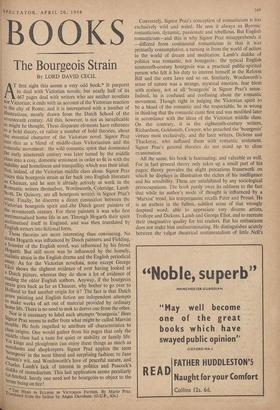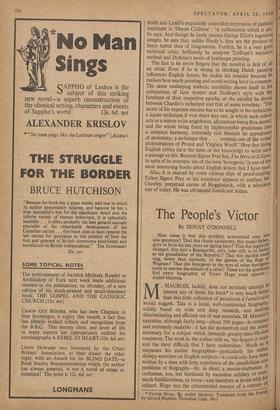BOOKS
The Bourgeois Strain
BY LORD DAVID CECIL T first sight this seems a very odd book.* It purports to deal with Victorian novels; but nearly half of its 467 pages deal with writers who are neither novelists Dr Victorian; it ends with an account of the Victorian reaction to the city of Rome; and it is interspersed with a number of illustrations, mostly drawn from the Dutch School of the seventeenth century. All this, however, is not as inexplicable 4' might be thought. These disparate elements have reference to a bold theory, or rather a number of bold 'theories, about the essential character of the Victorian novel. Signor Praz ,,ces this as a blend of middle-class Victorianism and the I('mantic movement : the wild romantic spirit that dominated the early nineteenth century was later tamed by the middle class into a cosy, domestic sentiment in order to fit in with the stability and homeliness and tranquillity which was their ideal. Not, indeed, of the Victorian middle class alone. Signor Praz traces this bourgeois strain as far back into. English literature 4; Chaucer, and he sees it already actively at work in the Romantic writers themselves. Wordsworth, Coleridge, Lamb. Scott, De Quincey, are all bourgeois writers in Signor Praz's Sc lse. Finally, he discerns a direct connection between the Victorian bourgeois spirit and .the Dutch genre painters of the seventeenth century. For these painters it was who first sentimentalised home life in art. Through Hogarth their spirit acclimatised itself in England, and was then translated by English writers into fictional form.
These theories are more interesting than convincing. No doubt Hogarth was influenced by Dutch painters, and Fielding, ■ a founder of the English novel, was influenced by his friend Hogarth. But still more was he influenced by the homely, realistic strain in the English drama and the English periodical essay. As for the Victorian novelists, none except George Eliot shows the slightest evidence of ever having looked at 4Dutch picture, whereas they do show a lot of evidence of reading the older English authors. Anyway, if the bourgeois strain goes back as far as Chaucer, why bother to go over to Holland to find another origin for it? The fact is that Dutch genre painting and English fiction are independent attempts 1° make works of art out of material provided by ordinary home life. There is no need to seek to derive one from the other. Nor is it necessary to label such attempts 'bourgeois.' Here Signor Praz seems to suffer from what might be called Marxist trouble. He feels impelled to attribute all characteristics to class origins. One would gather from his pages that only the middle class had a taste for quiet or stability or family life. Yet kings and ploughmen can enjoy these things as much as terchants and shopkeepers. Signor Praz applies the term bourgeois' in the most liberal and surpiising fashion; to Jane C/\,,hks usten's . Charles wit, and Wordsworth's love of peaceful nature, and Lamb's lack of interest in politics and Peacock's dislike of incendiarism. This last application seems peculiarly I.-fetched. Surely one need 'not be bourgeois to object to the house being on fire!
Tr*, THE HERO IN ECLIPSE IN VICTORIAN FICTION. By Mario Praz. "'slated from the Italian by Angus Davidson. (0.0 .P., 45s.) Conversely, Signor Praz's conception of romanticism is too exclusively wild and weird. He sees it always as Byronic romanticism, dynamic, passionate and rebellious. But English romanticism—and this is why Signor Praz misapprehends it —differed from continental romanticism in that it was primarily contemplative, a turning in from the world of action to the world of dream and meditation. Lamb's dislike of politics was romantic, not bourgeois : the typical English nineteenth-century bourgeois was a practical public-spirited person who felt it his duty to interest himself in the Reform Bill and the corn laws and so on. Similarly, Wordsworth's sense of nature was a strange, mystical emotion. fear blent with ecstasy, not at all' 'bourgeois' in Signor Praz's sense. Indeed, he is confused and confusing about the romantic movement. Though right in judging the Victorian spirit to be a blend of the romantic and the respectable, he is wrong in thinking that the romantic came first and was modified later in accordance with the ideas of the Victorian middle class. On the contrary, it is the eighteenth-century writers, Richardson, Goldsmith, Cowper, who preached the `bourgeois' virtues most exclusively, and the later writers, Dickens and Thackeray, who suffused them with romantic sentiment. Signor Praz's general theories do not stand up to close examination.
All the same, his book is fascinating; and valuable as well. For in fact general theory only takes up a small part of his pages; theory provides the slight precarious framework on which he displays in illustration the riches of his intelligence and his sensibility. These are uninhibited by any sociological preoccupations. The book partly owes its oddness to the fact that while its author's mode of thought is influenced by a `Marxist' trend, his temperament recalls Pater and Proust. He is an aesthete in the fullest, subtlest sense of that wrongly despised word; able to appreciate very diverse artists, 'Trollope and Dickens, Lamb and George Eliot. and to recreate their imaginative quality for hii readers. But his enthusiasm does not make him undiscriminating. He distinguishes acutely between the vulgar theatrical sentimentalism of little Nell's death and Lamb's exquisitely controlled expression of pathetic sentiment in 'Dream Children' : 'A sublimation which is art; he says. And though he justly praises George Eliot's ingenious images, he sees that, unlike Hardy's, they are the product of fancy rather than of imagination. Further, he is a very good technical critic; brilliantly he analyses Trollope's narrative method and Dickens's mode of landscape painting. The fact is he never forgets that the novelist is first of all an artist. Even if he is wrong in thinking Dutch painting influences English fiction, he makes his mistake because he realises how much painting and novel-writing have in common. The same unsleeping msthetic sensibility shows itself in his comparison of Jane Austen and Trollope's style with the furniture of their respective epochs, or the parallel he draws between Chardin's technique and that of some 'novelists ; 'The secret of his supreme success has to be sought in his technique' a legato technique if ever there was one, in which each colour acts as a mirror to its neighbours, all contrast being thus muted, and the whole being fused by imperceptible gradations into a compact harmony, extremely rich beneath its appearance of monotony; a technique that . . . reminds one of the verbal orchestrations of Proust and Virginia Woolf.' How few living English critics have the taste or the knowledge to write such a passage as this. Because Signor Praz has, The Hero in Eclipse, in spite of its eccentric use of the term 'bourgeois,' is one of the most interesting books about English fiction that I have read. Alas, it is marred by some curious slips of proof-reading. Either Signor Praz or his translator appears to confuse Mr. Crawley, perpetual curate of I-logglestock, with a television star of today. He was christened Josiah not Aidan.



















































 Previous page
Previous page